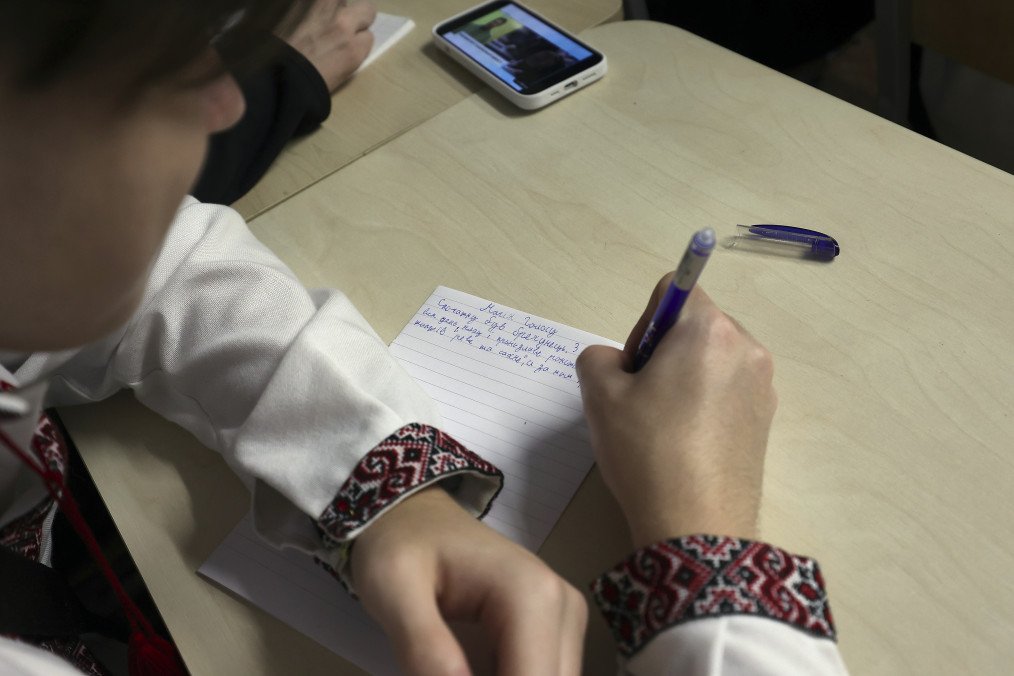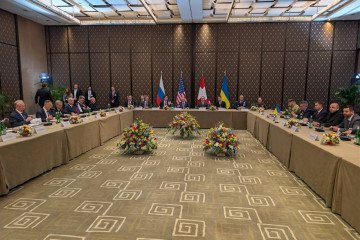- Category
- Latest news
Thousands of Children from Russian-Occupied Territories Secretly Attend Ukrainian Online Schools, Report Finds

Despite the risks involved, thousands of children from Ukrainian territories temporarily occupied by Russia continue to study online through Ukrainian schools.
According to the Ministry of Education of Ukraine, approximately 44,000 students remain enrolled in Ukrainian education programs, navigating significant challenges to preserve access to their national curriculum.
Current Time’s investigation reveals the difficulties faced by children and educators in Russian-occupied territories, including Donetsk, Luhansk, Zaporizhzhia, Mykolaiv, Kherson, and Kharkiv regions. Following the occupation, Russian authorities imposed sweeping changes on the education system, replacing Ukrainian curricula with Kremlin-approved narratives and banning Ukrainian education altogether, with strict enforcement measures in place.
The report highlights how children determined to continue their Ukrainian studies often resort to creative methods to avoid detection. Many participate in online classes under the pretense of attending music lessons or visiting relatives, keeping their cameras off to avoid identification and potential exposure to Russian authorities.
Stories of resilience
According to the investigation, Viktor, a student from a village in Mykolaiv region, refused to attend Russian schools during the occupation. Encouraged by his parents, he accessed Ukrainian materials secretly, often using limited resources such as borrowed textbooks.
Victoria, also from Mykolaiv region, recalled traveling to a teacher’s home via back roads to avoid detection. Her mother described preparing for the possibility of being stopped by carrying items to feign other intentions, such as a visit to a neighbor.
Teachers persist sespite risks
Current Time’s report also emphasizes the vital role of teachers under Russian occupation. Some, like Irina, the director of a school in Nova Kakhovka, refused to collaborate with occupation authorities. After being detained and later released, she left the region but continued teaching students online. Irina noted that students from occupied areas often attend lessons from basements or rural locations, where they feel safer.
Educators report that the prolonged war has made maintaining consistent education increasingly difficult. Students frequently split their time between mandatory attendance at Russian schools and online lessons with Ukrainian teachers. In some cases, family disagreements further complicate access to education, with parents divided on the risks of continuing Ukrainian studies.
Efforts to sustain Ukrainian education
Efforts to sustain Ukrainian education are supported by organizations like the Almeda Educational Center. Its director, Mariia Sulialina, described creative methods used to preserve instruction, such as teaching the Ukrainian language under the guise of music lessons.
Analyses of Russian textbooks retrieved from de-occupied areas reveal the erasure of Ukraine as a sovereign state, replaced by narratives framing Western nations as adversaries. Russian authorities invest heavily in infrastructure and youth programs, promoting loyalty to the Kremlin among students.
To address these challenges, the Ministry of Education of Ukraine is exploring options to preserve access to online education for students in occupied territories. Proposed solutions include maintaining some online schools or offering specialized courses in Ukrainian language and history. Officials emphasize the importance of ensuring children in these regions remain connected to Ukrainian education, regardless of their circumstances.
-b2fecf006e6a7ef2d3584636123ee64f.jpg)


-c439b7bd9030ecf9d5a4287dc361ba31.jpg)




-72b63a4e0c8c475ad81fe3eed3f63729.jpeg)